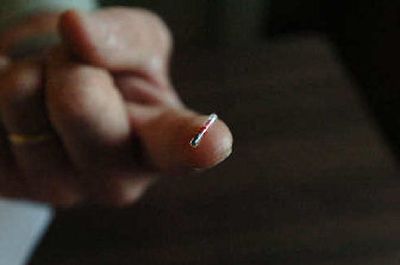Protection for your pets

A grateful purr was all Natasha revealed when she was reunited with her owner, Monica Klein, after a week of adventure. Fortunately, more detailed information was disclosed through the tiny computer chip implanted in the 5-month-old tabby.
A microchip about the size of a grain of rice let Kootenai Humane Society shelter workers know that Natasha had a home in Hauser. Klein was on vacation and left her three kittens under the care of a neighbor. The curious and friendly Natasha wandered away and wound up at Kootenai Humane Society where she was dropped off as a stray.
Klein’s kittens were adopted as siblings from a Spokane shelter where microchipping is required. When Klein picked up her well-fed and contented kitty from Kootenai Humane Society, she was surprised to hear that she was lucky. Not every animal control agency scans stray pets for microchips.
“There has to be some consistency,” she said. “I did everything I was supposed to do. I was disappointed to hear this may not have been such a happy ending.”
Kootenai Humane Society, Coeur d’Alene Animal Shelter and Post Falls Animal Safety all claim they do scan every incoming animal, but the policy is not uniform nationally. The scanner works by seeking a radio signal that is emitted through the skin of the animal from an implanted chip. The scanner reads a unique identification number and a call to the microchip center reveals an owner’s information.
Implanting the device takes less than five minutes and is similar to receiving a vaccination. It involves injecting a glass, biocompatible capsule under the skin between the animal’s shoulder blades. Connective tissue forms over the capsule and holds the chip in place. Local veterinarian fees range from $30 to $60 for the procedure and registration.
Some people object to the “Big Brother” feel of the microchipping device, but the only information accessible is the owner’s name, phone numbers, veterinarian and special needs of the pet. Shelters are in favor of microchips since so much of their kennel space is filled with lost and wayward animals. In July, Kootenai Humane Society took in 95 stray cats and dogs. Of these, 15 were reunited with their owners and only two of those reunions were due to microchips.
“If we could teach the animals to talk, they would tell us where they live,” Phil Morgan, Kootenai Humane Society executive director said. “Microchipping is probably one of the most important ways to be a responsible pet owner. It’s the best investment you can buy for your pet.”
He estimates that less than one percent of their incoming strays have microchips. He initiated a new policy when he arrived at Kootenai Humane Society this summer, which requires all animals to have chips placed upon adoption. Adoption fees increased $10 to help cover the cost. No other Kootenai County shelter is presently requiring this procedure. Morgan is considering a policy some shelters have implemented, which requires animals to be microchipped before they are returned to the owners who lost them.
“If everyone would microchip, it would make our lives much easier,” he said.
Morgan points out that collars and tags fall off and dogs like to run away during bath time. Although Kootenai Humane Society has a no-kill policy, some local shelters euthanize within five days. For a family on vacation, their pet search may begin too late. Morgan sees microchips as another strategy in reducing euthanasia rates.
One downfall to the system is that owners forget to update information when they move or change phone numbers. This can be done via the Internet. Coeur d’Alene Animal Shelter manager Debi Slater finds that few of their strays have microchips and of those that do, the information is out of date.
“It turns out to be a dead end for us,” she said. “You have to update information or the chip does no good whatsoever.”
Despite that drawback, Slater does like the idea of microchipping to reduce the number of lost and stray animals filling her kennels.
“I think it’s a wonderful idea,” she said. “If every dog was microchipped, they could all go home.”